Tags
Analogue Internet, Charles Ammi Cutter, dissertation, H.G. Wells, information futurology, information history, information technology, International Institute of Bibliography, Internet history, Memex, Mundaneum, Paul Otlet, Semantic Web, Universal Decimal Classification, Vannevar Bush, Wikipedia, World Brain
Now that the taught part of my MSc in Library Science is complete (final grades permitting), there is nothing between me and the qualification save for the small matter of the dissertation—an extended piece of original research, ideally spanning between 15,000 and 20,000 words. Looking through the course’s repository of past projects (and that of the sister MSc in Information Science) has been an enjoyable and illuminating experience, with extreme diversity in evidence. Previous studies—and the ideas that I have discussed with my current coursemates—cover every conceivable aspect of the subject, from explorations of the theory of information itself, information provision in certain periods and locations in history, the social and political roles of libraries in modern society, through to practical studies into a particular aspect of the contemporary library service. (Literally as I have been writing this blog post, David Bawden, who oversees the dissertations, has helpfully provided a fuller list of examples, including my own!) I have decided upon my topic by the simple expedient of expanding upon the aspect of the course which I have enjoyed the most (in an effort to keep myself sane until the hand-in time of late September!): the predictions of future library and information service technologies made by pioneering figures in the profession’s past, an interest which was first sparked by reading Charles Ammi Cutter’s essay, The Buffalo Public Library in 1983 during the year before I embarked upon the course.
After initially thinking about an extremely wide-ranging project, including aspects such as science fiction and popular perceptions of libraries, I came across the article The Future of the Web is 100 Years Old by Alex Wright, author of a recent biography of Paul Otlet, the Belgian documentalist and bibliographer who is probably best-known for devising the Universal Decimal Classification system, which contrasted how the ideas of Otlet and Vannevar Bush, the American computer engineer and scientific administrator, famous for his seminal essay As We May Think, have influenced the development of the modern Internet. Searching the literature, I discovered a sizable (but not overwhelming!) body of research that has been conducted into the work of these two men—and also that of the writer and political activist, H.G. Wells—and how their predictions of future information technology, featuring many extremely perceptive and accurate observations, can collectively be defined as a sort of “proto-” or “analogue” Internet, and have experienced something of a revival of late as the Digital Internet itself has become ubiquitous over the last twenty years, and perhaps also because of the contemporaneous development of the steampunk genre in literature.
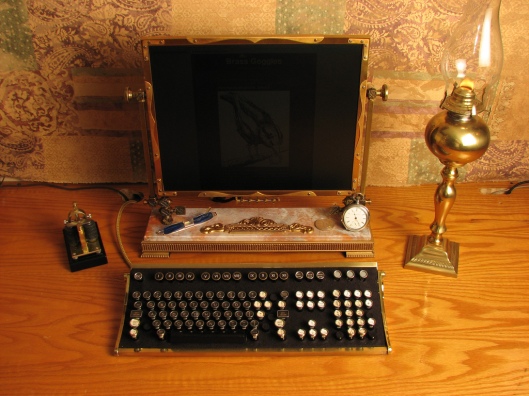
A current revival of interest in historic ICT predictions may be symptomatic of a wider fascination with the “steampunk” genre, which habitually blends the contemporary with the antiquated.
The working title of my dissertation is therefore “Anticipating the Internet: how the predictions of Paul Otlet, H.G. Wells and Vannevar Bush have shaped the Digital Information Age”.
Paul Otlet
Paul Otlet (1868–1944) was a Belgian visionary who believed that controlled, standardised bibliography was the key to the advancement of human knowledge. His drawing below illustrates his theory of knowledge: facts and observances about the universe are parsed through human brains to create academic disciplines and fields of study which are then codified in books and other written information sources, ultimately forming a library of information.
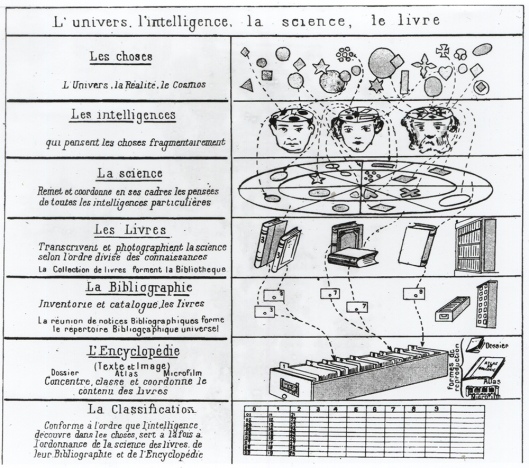
Paul Otlet’s conceptual model of how human knowledge is recorded. The universal catalogue transcends the limitations of individual books and other physical “carriers” of information.
However, the book itself as a repository or “carrier” of information is only as effective as the bibliographic tools that are used to locate the information therein: hence the additional stages of creating a bibliographic index and control, a universal encyclopedia (based on a card-catalogue index), and a classification system (UDC) to organise and map the knowledge produced in this way.
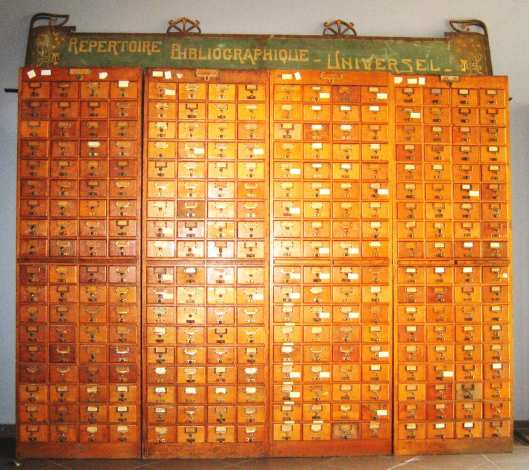
A section of the Mundaneum—Otlet’s Universal Bibliographic Repertory based on the catalogue-card index format. Otlet’s efforts produced over 12 million of these index cards and other documents during his lifetime
Otlet’s goal of building a fully-functional Mundaneum transcended the “mere” creation of a comprehensive world encyclopaedia, however, and extended towards creating a new “World City” with a complex of libraries and museums at its heart, all of which would be disseminated by networked technology created by the development and synthesis of then-current technology, and facilitated through the efforts of international organisations such as Otlet’s own International Institute of Bibliography (IIB)—now The International Federation for Information and Documentation (FID)—sadly stymied in turn by the successive outbreaks of two World Wars and the associated tension in between, which destroyed the Belle Époque ideals with which Otlet grew up. He also envisioned ICTs that foreshadow real devices that were currently developed, whilst his organising ideals have been preserved in current projects such as the Semantic Web. However, the comparatively anarchic and free-form nature of Wikipedia, perhaps the nearest thing to a spiritual successor of the Mundaneum, would likely have horrified Otlet, who favoured a top-down approach to information controlled by renowned experts.
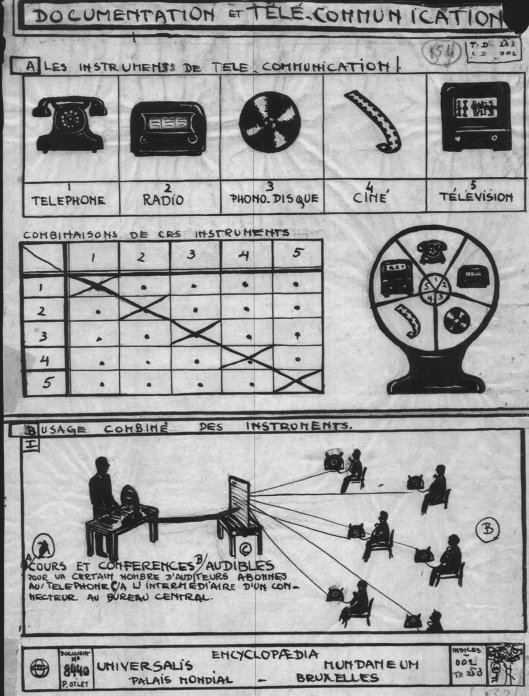
Otlet envisaged the synthesis of different forms of (at the time) emergent technology, anticipating the conference call and the potential for the networked dissemination of information.
H.G. Wells
Herbert George (H.G.) Wells (1866—1946) was a contemporary of Otlet, and the two were certainly aware of each other’s work. Wells was a prolific writer of non-fiction works and political activist in addition to authoring his bestselling science-fiction novels. Something of an idealist like Otlet, he too became aware and frustrated with the limitations of existing technology, and envisaged a “World Brain” of knowledge to fulfil the same function as Otlet’s Mundaneum.
Wells was a passionate believer in the progression of scientific and academic knowledge as a means of improving society, viewing—in a continuation of his biological analogy—that existing political and economic structures were “diseased”, and that a new “network of nerves” of knowledge must be constructed to remodel society. In contrast to Otlet, his overtly political stance and apparent acceptance of a high degree of authoritarianism in order to achieve a functioning World Brain has resulted in his ideas attracting attention for what one might call the “wrong” reasons: government collection and control of information, surveillance, and, latterly, comparisons to the growth of technical monoliths such as Google. His advocacy of a single user authentication for the system has also influenced debates on the subject of individual privacy and security on the modern Internet, which notoriously lacks such a feature.
Vannevar Bush
Vannevar Bush (1890—1974) was a generation younger than Otlet or Wells, and his predictions benefit from both their work (and that of other contemporary figures) and the fact that digital computers and the forerunner of the modern Internet were becoming practical realities during his time of writing (As We May Think was published in 1945). He was also a qualified engineer and experienced scientific administrator within the United States—serving as chairman of the National Defense Research Committee and the Office of Scientific Research and Development, and playing a leading role in the National Science Foundation, giving him the strongest practical background for envisioning what future information technology might come to be like.
In his essay, Bush introduced his pet project, the Memex (short for Memory Extender): a personalised cabinet that could produce personalised “memory trails” of related information using an array of microfilm. It has often referred to as the conceptual forerunner of hypertext, which allows modern Internet users to do much the same thing.
The main conceptual difference between the Memex and the similar ideas proposed by Otlet and Wells is that it was intended to be a highly personal form of technology, for use by the advanced research scholar or professional, as opposed to the latter pair’s grandiose schemes of improving universal knowledge through the creation of an all-encompassing information infrastructure. Perhaps surprisingly, the utopian ideals of Otlet and Wells require a rigid imposition of top-down control over what the “true” information actually is, whereas Bush, despite his government position during an era marked by the freezing over of relations between the United States and the Soviet Union, disregards this entire question in favour of focussing upon the practicalities of creating a workable technology for the individual user.
The video below shows an animation of the Memex in action:
This research project
Briefly, my dissertation aims to:
- identify the predictions about future ICTs made by Otlet, Wells and Bush in turn and analyse them within their broader contexts to determine why they were made;
- compare and contrast these predictions with one another, determining to what extent each man’s ideas influenced the others and answering the question: “are they fundamentally the same with superficial differences, or are they in fact significantly different and have been grouped together arbitrarily?”; and
- ascertain what role their ideas, in both a conceptual and technical sense, influenced the development of the Internet and its associated technology and infrastructure in reality, and whether their importance in this respect in relation to one another has changed as the Internet itself has evolved, such as the recent transition from “Web 1.0” to “Web 2.0” and debates over issues including the Semantic Web and its ownership.
The dissertation will consist of an extended literature review conducted through desk research; in other words, I will be living in the British Library for most of this summer! I also hope to visit the Mundaneum itself, now a museum in Mons dedicated to preserving Otlet’s legacy.
All in all, I’m looking forward to starting this project, conducting a sizeable amount of original research and producing a valid piece of academic scholarship at the end of it. As I also need to find a full-time job and a new place to live by the end of summer, it should prove to be a hectic, although I hope enjoyable, few months.

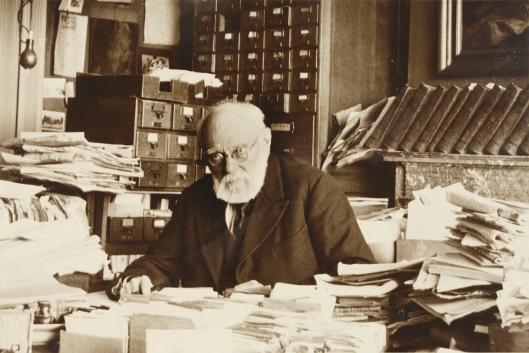
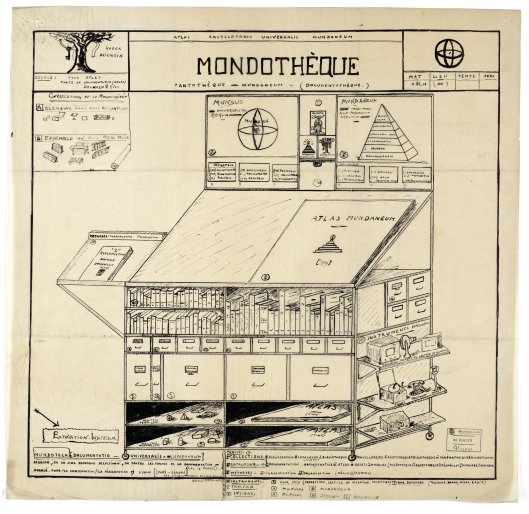


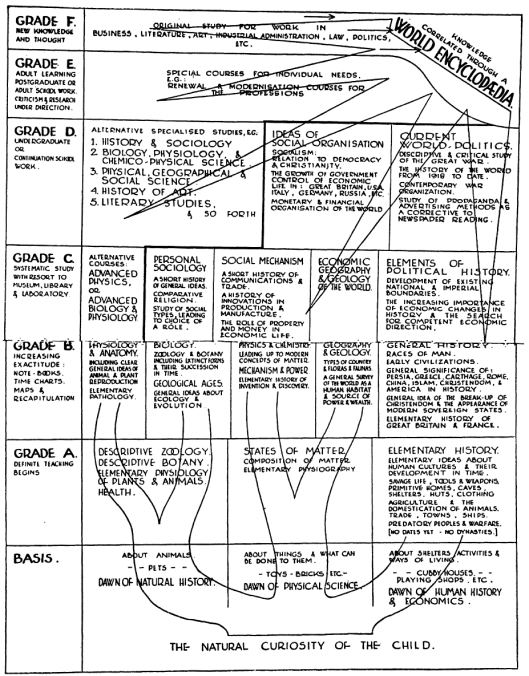
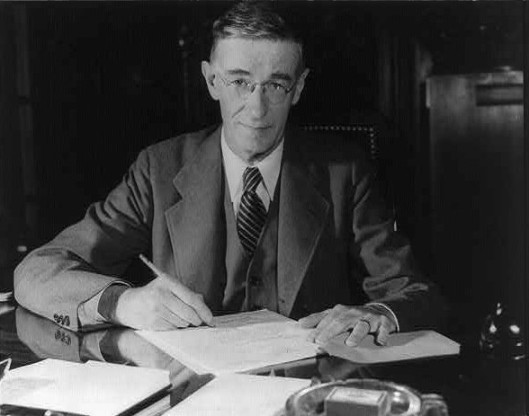
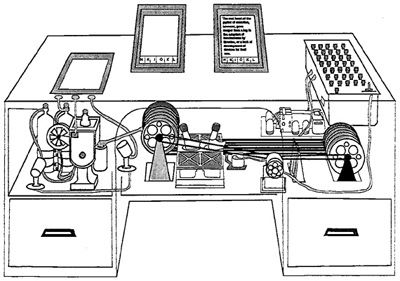
This is a fascinating topic Dom! I’m really interested in this sort of technological futurism, and Vannevar Bush is a fascinating character. i’d recommend having a look into the Air Force’s RAND think tank as well. Best of luck!
LikeLiked by 1 person
Great introduction to your project and such an interesting topic. I also have research trip envy!
LikeLiked by 1 person
Pingback: #citymash: a report on a library and technology unconference at City University London | The Library of Tomorrow
Pingback: Visiting the Mundaneum | The Library of Tomorrow
Pingback: A voyage of Discovery: life after #CityLIS | The Library of Tomorrow